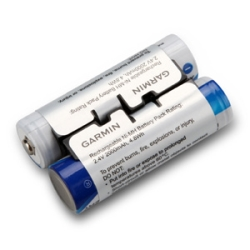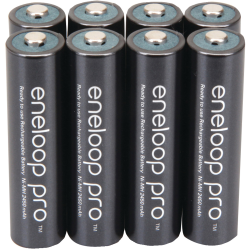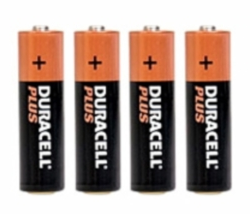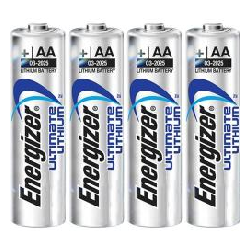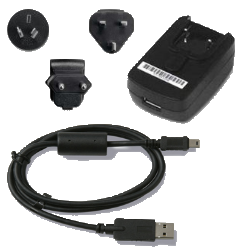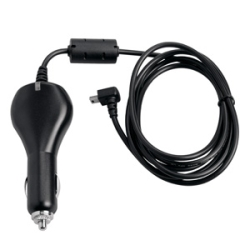Stay Powered
The Garmin GPSMAP 66 continues to set the standard when it comes to integrated handheld GPSr power source versatility, offering two integral battery options to keep your device powered during remote adventures:- While you're taking time to rest, the Garmin NiMH battery pack can be recharged by an external power supply without removing it from the device.
- For those longer trips off the grid, the GPSMAP 66 can be powered by any pair of AA batteries, providing additional run time without being weighed down.
Charging the Battery
- The GPSMAP 66 will charge an installed Garmin NiMH battery pack while an external power source is connected.
- The battery and cover may reach external temperatures > 95⁰F (35⁰C), with internal temperatures > 120⁰F (50⁰C) during the charging process.
- Completely charging a fully depleted battery pack may require 10+ hours.
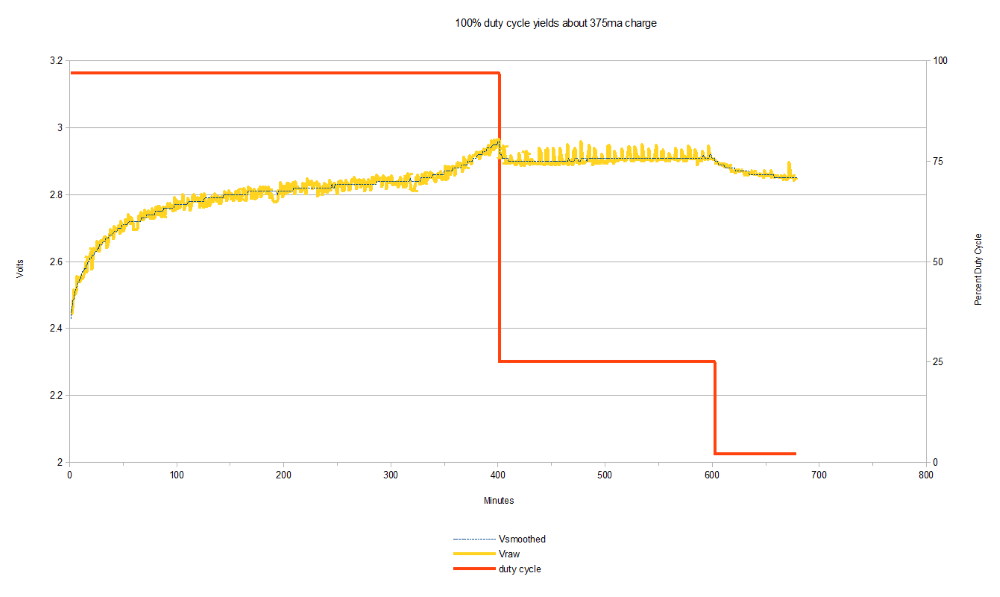
Typical Garmin GPSr NiMH battery charge sequence. (click for full size image)
Maximizing Battery Life
The GPSMAP 66 can provide up to 44 hours of power from a single pair of AA batteries. Alkaline batteries loose a significant amount of their capacity as temperature decreases. Use only lithium batteries when operating the GPSMAP 66 in sub-zero temperatures. If not planning to use the GPSMAP 66 for an extended period of time, store the device with the batteries removed. Several options are available to extend battery life:- Exit the Camera application when not taking photos
- Turn the Backlight off when not absolutely needed
- Decrease Backlight Brightness
- Reduce Backlight Timeout
- Enable Battery Save Mode (view test results)
- Disable Wi-Fi
- Disable Bluetooth
- Disable ANT+ Sensors
- Disable the magnetic compass
- Disable GLONASS
- Disable GALILEO
- Disable WAAS/EGNOS
- Configure Altimeter - Pressure Trending for 'Save When Power On'
- Adjust Recording Controls to 'Auto' or 'Off'
- Set Map Orientation to 'North Up', not 'Track Up'
- When permissible, use the Compass or Trip Computer pages while navigating, not the Map page
- Enable Expedition Mode when permissible
Hot Swap
On occasion, you may encounter situations where your GPSMAP 66 battery reserve is running low and you need to replace the batteries without rebooting the GPSr. For example, when [Setup > Altimeter > Pressure Trending = Save Always] is selected, the device displays "WARNING: Do not remove the batteries while this feature is active."In these circumstances, a Hot Swap can be accomplished using any device with a powered USB port. On grid, this may be a home or laptop computer, the AC adapter that came with your Garmin GPSMAP 66, or similar devices. Off grid, a portable computer or auxiliary power source designed to power/recharge USB enabled mobile devices should be sufficient (Our favorite off grid solutions).
Performing the Hot Swap is a quick and easy process:
- Remove the battery cover
- Connect external USB power source
- Allow the GPSr several seconds to register the external power source
- Carefully remove and replace the GPSr batteries
- Ensure replacement batteries are properly seated and oriented
- Remove external USB power source
- Select [Stay On] when prompted
- Replace the battery cover
- Check GPSr for proper function
Battery Display
- The GPSMAP 66 battery icon provides information about the battery charge level, charging status, and current power source.
- Remaining battery capacity is updated dynamically based on current battery load conditions.
- A reduction of indicated battery capacity may be observed while using high current draw features (see Power Consumption).
Powered On
- Current power information can be viewed in the Status Bar, Status Page, Small Data Fields, and Large Data Field:
|
|
|
|
|
|||
|---|---|---|---|---|---|---|
| = |
||||||
 |
 |
 |
 |
|||
| Remaining Battery Capacity |
Charging Process Active |
Battery Fully Charged |
External Power Source |
Standby Mode
- The GPSMAP 66 can not charge the battery pack while powered off, but can be put into a 'standby mode' by pressing and holding the power button.
- Connected to an external USB power source and placed into 'standby mode', the GPSMAP 66 will charge a NiMH battery pack to full capacity:
 |
======== |
 |
|
|---|---|---|---|
| Charging Process Active | Battery Fully Charged |
Power Options
- Multiple options are available to help keep your GPSMAP 66 running for as long as you are:
| Garmin NiMH |
||
|---|---|---|
|
||
| =/= |
================================================================= |
|
| Rechargeable NiMH |
||
|
||
| Alkaline |
||
|
||
| Lithium |
||
|
||
| External AC |
||
|
||
| External DC |
||
|
||
Power Consumption
- Calculate your GPSMAP 66 battery consumption by selecting one value from each applicable category and adding them together.
- Estimated total run time (in hours) = (Battery Capacity mAh / Calculated Consumption mA).
- Garmin GPSMAP 66 measured energy consumption figures will be posted here once a mature firmware has been published.
Battery Test
First, a word about battery consumption testing. Outside of a precisely controlled laboratory environment, no battery test result can be absolute. In real world scenarios (where we like to use our GPSr) many variables can and will affect battery consumption rates, and therefore two seemingly identical units with identical settings and identical batteries may not exhibit identical performance.For the purpose of these tests, a GPSMAP 66 was adjusted for minimal operational status (our test simulates using the GPSr primarily for tracking purposes) in an attempt to record best case scenario results. Combining this information with the power consumption chart above, one can approximate the useful lifespan for a chosen power source.
During each battery test, the following conditions were observed:
- Ambient Temperature: 75ºF
- GPS: Enabled
- GLONASS: Disabled
- Galileo: Disabled
- WAAS/EGNOS: Disabled
- Compass: Disabled
- Backlight Brightness: 50%
- Backlight Timeout: 15 Seconds
- Battery Save: Enabled
- Wi-Fi: Disabled
- Bluetooth: Disabled
- ANT+ Sensors: Disabled
- Track Log Recording: 00:01:00
- Expedition Mode: Disabled
At the beginning of each test, brand new or freshly charged batteries are installed, the current track log is reset, and a new track log recording is initiated at a rate of one track point per minute. During each test period, the GPSMAP 66 is checked periodically for activity. When it is discovered the GPSr has stopped functioning, the batteries are removed, the Current.gpx track log file is imported into BaseCamp, and the total run time is recorded.
GPSMAP 66 Battery Test Results:
|
Rayovac High Energy 815 ALK 17h 22m (GPSMAP 66s v990) |
|
Amazon Basics Performance Alkaline ALK 20h 07m (GPSMAP 66s v990) |
|
Amazon Basics HR-3UTHA-AMZN NiMH HC LSD 2400 mAh 23h 07m (GPSMAP 66s v990) |
|
Energizer Ultimate Lithium Li-FeS2 3000 mAh 44h 51m (GPSMAP 66s v990) |
